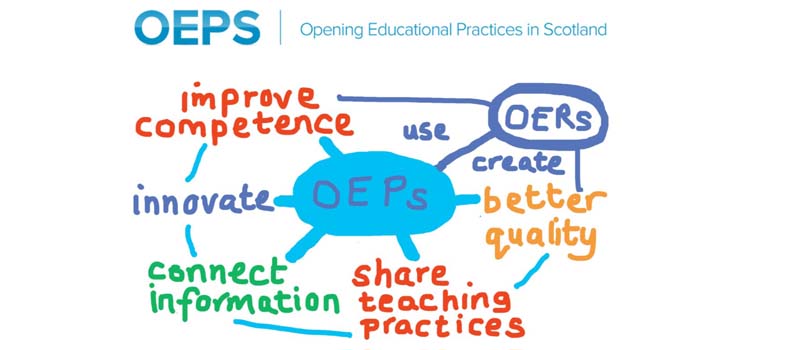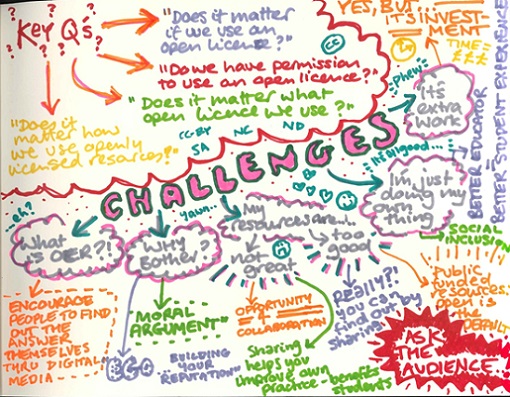2.4 Why openly license my own materials?
The last section explored some of the reasons to seek out and utilise OER. However, in order to facilitate 'open' best practice it is also good to share material you have created too (and therefore complete the ‘virtuous circle’ mentioned in Section 1.4 [Tip: hold Ctrl and click a link to open it in a new tab. (Hide tip)] ). After all, materials can’t really be called ‘open’ unless they are both shared and when they’re being created they are made as reuseable as possible (e.g. by providing creator information and details of how you would like them to be reused).

There are many reasons for sharing materials. By releasing material on an open licence you might increase the visibility and reputation of your work, find new audiences and networks, or receive increased feedback on what you are doing. Often people are altruistically motivated and become involved in different open practices such as openly licensing their own materials and sharing their resources in order to ‘open up’ or increase participation or widen access to otherwise closed environments and information. By widening access to information, knowledge can be shared more effectively, particularly with people who might otherwise be unable to access materials (e.g. for reasons such as cost or geography).
When thinking about whether or not to openly license your work, you might have some reservations. For example:
- Do I have the skills or knowledge to license my material?
- If I blog about my research might someone steal my ideas?
- Are my resources good enough?
- What will my colleagues and students think?
- Am I allowed to release my teaching materials on an open licence?
- Do I have the technical and digital skills to create OER?
The sketch note above (which was produced as part of a visual recording of Josie Fraser’s keynote at OEPS Forum 4) shows the results of an ‘ask the audience’ exercise. Josie asked the audience to respond to commonly heard reasons educators give for not using or sharing materials in the open.
Activity 2C
Some of the challenges noted above may resonate with you, or you may have heard of some from colleagues. Pause for a moment and write down any thoughts or responses to these, or note down any questions you’ve heard that are not on the list or in the sketch note above, in your reflective log.
Whilst using or incorporating OER into your own practice might not always be visible or impact on others in an obvious way, becoming more open in your practice and sharing your material or resources openly may lead to unanticipated changes to your current practice. You might develop different working strategies, take a different approach to designing the materials themselves or collaborate differently with colleagues if you choose to co-develop openly licensed materials. Letting colleagues and students know that you are using an open resource and explaining what it means can also raise awareness and open up discussions around ‘open’.
Your own, your institution and/or organisation’s approaches to sharing and openness will also have an impact on how you move toward more open ways of practice. Experimenting with releasing images you have created in your own time (for example, holiday photos) openly on Flickr is a great place to start. Depending on your institution’s approach and view of open practices, openly licensing your course materials or resources created in work time might be a more complex matter, particularly in relation to intellectual property and ownership of the resource. To resolve copyright issues, some Scottish Universities, including the University of Edinburgh and Glasgow Caledonian University, have introduced policies to encourage their students and educators to release material in the open.
Activity 2D
Reflect on your own institution or organisation and using your reflective log, write down your responses to the following questions:
- Would it be appropriate to share outputs or resources you have created on an open licence?
- In what ways, if any, does your institution or organisation support the use and creation of open resources?
- Is there a specific person or team you can ask for assistance? If so, note down their name(s) and details. If you are not sure whether there is any support available to you, you may want to check with colleagues or if you work in a college or university, with library staff.
- Does your institution or the organisation you work for have a policy on OER and/or OEP?
2.3 Why use open educational resources (OER)?

